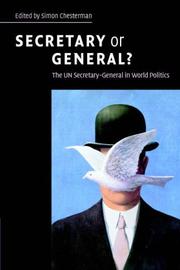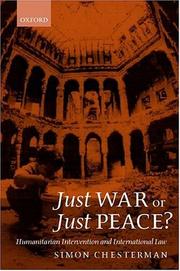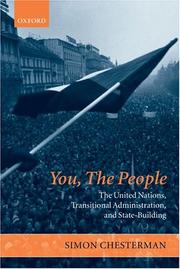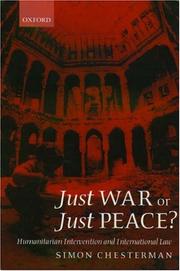| Listing 1 - 10 of 35 | << page >> |
Sort by
|

ISBN: 9780521699587 9780521876155 052187615X 0521699584 9780511618680 1107172454 0511274998 0511275692 0511309414 0511618689 1280815868 0511273460 0511274254 9780511275692 9780511274992 9781107172456 9781280815867 9780511273469 9780511309410 9780511274251 Year: 2007 Publisher: Cambridge New York Cambridge University Press
Abstract | Keywords | Export | Availability | Bookmark
 Loading...
Loading...Choose an application
- Reference Manager
- EndNote
- RefWorks (Direct export to RefWorks)
The Secretary-General of the United Nations is a unique figure in world politics. At once civil servant, the world's diplomat, lackey of the UN Security Council, and commander-in-chief of up to a hundred thousand peacekeepers, he or she depends on states for both the legitimacy and resources that enable the United Nations to function. The tension between these roles - of being secretary or general - has challenged every incumbent. This book brings together the insights of senior UN staff, diplomats and scholars to examine the normative and political factors that shape this unique office with particular emphasis on how it has evolved in response to changing circumstances such as globalization and the onset of the 'war on terror'. The difficulties experienced by each Secretary-General reflect the profound ambivalence of states towards entrusting their security, interests or resources to an intergovernmental body.
International relations. --- World politics. --- Relations internationales --- Politique mondiale --- United Nations. --- United Nations --- Management. --- Politique mondialeUnited Nations. --- United NationsManagement. --- BPB0801 --- 341.123 UNO --- United Nations.Verenigde Naties--(algemeen)--UNO --- 341.123 UNO United Nations.Verenigde Naties--(algemeen)--UNO --- International relations --- World politics --- Colonialism --- Global politics --- International politics --- Political history --- Political science --- World history --- Eastern question --- Geopolitics --- International organization --- Coexistence --- Foreign affairs --- Foreign policy --- Foreign relations --- Global governance --- Interdependence of nations --- International affairs --- Peaceful coexistence --- World order --- National security --- Sovereignty --- UN --- UNO --- Naciones Unidas --- Nations Unies --- ONU --- Organisation des Nations Unies --- Organizat︠s︡ii︠a︡ Obʺedinennykh Nat︠s︡iĭ --- OON --- Vereinigte Nationen --- Umot ha-meʼuḥadot --- Organizacja Narodów Zjednoczonych --- ONZ --- Forente nasjoner --- Forenede nationer --- FN --- Förenta nationerna --- Gaertʻianebuli erebi --- Organização das Nações Unidas --- PBB --- Perserikatan Bangsa-Bangsa --- Kokusai Rengō --- Kokuren --- ENSZ --- Egyesült Nemzetek Szövetsége --- Birleșmiș Milletler Teșkilâtı --- Birlăşmiş Millătăr Tăşkilatı --- Birlashgan Millatlar Tashkiloti --- BMT --- YK --- Yhdistyneet kansakunnat --- OUN --- Organizacija Ujedinjenih Nacija --- NU --- Nazioni Unite --- OSN --- Organizace spojených národů --- Sāzmān-i Milal-i Muttafiq --- Bangsa² Bersatu --- Organización de las Naciones Unidas --- Ühinenud Rahvaste Organisatsioon --- ÜRO --- Organismos tōn Hēnōmenōn Ethnōn --- Umoja wa Mataifa --- Vereinten Nationen --- Vereinte Nationen --- Hayʼat al-Umam al-Muttaḥidah --- Verenigde Naties --- VN --- Organizația Națiunilor Unite --- Um --- Lien ho kuo --- OKB --- Organizata e Kombeve të Bashkuara --- Lian he guo --- U.N. --- Umam al-Muttaḥidah --- OĒE --- Hēnōmena Ethnē --- Organizácia Spojených Národov --- Sahaprachāchāt --- Națiunile Unite --- Organizat︠s︡ii︠a︡ na obedinenite nat︠s︡ii --- Organismos Hēnōmenōn Ethnōn --- Manẓūmat al-Umam al-Muttaḥidah --- AAN --- Arhanizatsyi︠a︡ Ab'i︠a︡dnanykh Natsyĭ --- Nações Unidas --- Orhanizat︠s︡ii︠a︡ Ob'i︠e︡dnanykh Nat︠s︡iĭ --- O.Ē.E. --- ʻOngkān Sahaprachāchāt --- Sjuninejal Konob'laq --- Sāzmān-i Milal-i Muttaḥid --- Milal-i Muttaḥid --- Nėgdsėn U̇ndėstniĭ Baĭguullaga --- NUB --- Rāshṭrasaṃgha --- או״מ --- أمم المتحدة --- الأمم المتحدة --- سازمان ملل متحد --- 国際連合 --- 联合囯 --- 聯合國 --- United Nations Organization --- Liên Hiệp Quó̂c --- Liên Hợp Quó̂c --- LHQ --- Kula Samagga --- YūʼAṅʻnʻ --- 联合国 --- Организация на обединените нации --- Организация Объединённых Наций --- Social Sciences --- Political Science

ISBN: 0199243379 9780199243372 Year: 2001 Publisher: Oxford Oxford university press
Abstract | Keywords | Export | Availability | Bookmark
 Loading...
Loading...Choose an application
- Reference Manager
- EndNote
- RefWorks (Direct export to RefWorks)
Humanitarian intervention. --- Intervention (International law) --- Humanitarian intervention --- 355.357 --- 341 --- Military intervention --- Diplomacy --- International law --- Neutrality --- Intervention (International law).

ISBN: 0199284008 9780199263486 0199263485 9780199284009 0191600997 1435614283 1281345989 9786611345983 019153630X 9780191600999 9781435614284 9780191536304 Year: 2005 Publisher: Oxford New York Oxford University Press
Abstract | Keywords | Export | Availability | Bookmark
 Loading...
Loading...Choose an application
- Reference Manager
- EndNote
- RefWorks (Direct export to RefWorks)
The governance of post-conflict territories embodies a central contradiction - how does one help a population prepare for democratic governance and the rule of law by imposing a form of benevolent autocracy? This book explores the transitional administrations put in place by the UN.
Nouveaux Etats indépendants --- Droit d'ingérence humanitaire --- Peacekeeping forces. --- Postwar reconstruction. --- United Nations -- Peacekeeping forces. --- Nouveaux Etats indépendants --- Droit d'ingérence humanitaire --- Post-conflict reconstruction --- Reconstruction, Postwar --- Humanitarian intervention. --- United Nations --- Intervention (International law) --- UN --- UNO --- Political participation --- Public administration --- Newly independent states --- Participation politique --- Administration publique (Science) --- Politics and government. --- Politique et gouvernement --- Developing countries --- Pays en développement --- Naciones Unidas --- Nations Unies --- ONU --- Organisation des Nations Unies --- Organizat︠s︡ii︠a︡ Obʺedinennykh Nat︠s︡iĭ --- OON --- Vereinigte Nationen --- Umot ha-meʼuḥadot --- Organizacja Narodów Zjednoczonych --- ONZ --- Forente nasjoner --- Forenede nationer --- FN --- Förenta nationerna --- Gaertʻianebuli erebi --- Organização das Nações Unidas --- PBB --- Perserikatan Bangsa-Bangsa --- Kokusai Rengō --- Kokuren --- ENSZ --- Egyesült Nemzetek Szövetsége --- Birleșmiș Milletler Teșkilâtı --- Birlăşmiş Millătăr Tăşkilatı --- Birlashgan Millatlar Tashkiloti --- BMT --- YK --- Yhdistyneet kansakunnat --- OUN --- Organizacija Ujedinjenih Nacija --- NU --- Nazioni Unite --- OSN --- Organizace spojených národů --- Sāzmān-i Milal-i Muttafiq --- Bangsa² Bersatu --- Organización de las Naciones Unidas --- Ühinenud Rahvaste Organisatsioon --- ÜRO --- Organismos tōn Hēnōmenōn Ethnōn --- Umoja wa Mataifa --- Vereinten Nationen --- Vereinte Nationen --- Hayʼat al-Umam al-Muttaḥidah --- Verenigde Naties --- VN --- Organizația Națiunilor Unite --- Um --- Lien ho kuo --- OKB --- Organizata e Kombeve të Bashkuara --- Lian he guo --- U.N. --- Umam al-Muttaḥidah --- OĒE --- Hēnōmena Ethnē --- Organizácia Spojených Národov --- Sahaprachāchāt --- Națiunile Unite --- Organizat︠s︡ii︠a︡ na obedinenite nat︠s︡ii --- Organismos Hēnōmenōn Ethnōn --- Manẓūmat al-Umam al-Muttaḥidah --- AAN --- Arhanizatsyi︠a︡ Ab'i︠a︡dnanykh Natsyĭ --- Nações Unidas --- Orhanizat︠s︡ii︠a︡ Ob'i︠e︡dnanykh Nat︠s︡iĭ --- O.Ē.E. --- ʻOngkān Sahaprachāchāt --- Sjuninejal Konob'laq --- Sāzmān-i Milal-i Muttaḥid --- Milal-i Muttaḥid --- Nėgdsėn U̇ndėstniĭ Baĭguullaga --- NUB --- Rāshṭrasaṃgha --- או״מ --- أمم المتحدة --- الأمم المتحدة --- سازمان ملل متحد --- 国際連合 --- 联合囯 --- 聯合國 --- United Nations Organization --- Liên Hiệp Quó̂c --- Liên Hợp Quó̂c --- LHQ --- Kula Samagga --- YūʼAṅʻnʻ --- 联合国 --- Организация на обединените нации --- Организация Объединённых Наций

ISBN: 019925799X 9780199257997 Year: 2003 Publisher: Oxford: Oxford university press,
Abstract | Keywords | Export | Availability | Bookmark
 Loading...
Loading...Choose an application
- Reference Manager
- EndNote
- RefWorks (Direct export to RefWorks)
This book asks whether states have the right to intervene in foreign civil conflicts for humanitarian reasons. The UN Charter prohibits state aggression, but many argue that such a right exists as an exception to this rule. Offering a thorough analysis of this issue, the book puts NATO's action in Kosovo in its proper legal perspective.
Book
ISBN: 019171402X 9780191714023 0191021814 Year: 2002 Publisher: Oxford : Oxford University Press,
Abstract | Keywords | Export | Availability | Bookmark
 Loading...
Loading...Choose an application
- Reference Manager
- EndNote
- RefWorks (Direct export to RefWorks)
This volume critically examines the question of whether there is a right to intervene in a civil conflict for humanitarian reasons. It puts NATO's action in Kosovo in its proper legal perspective.
Humanitarian intervention. --- Intervention (International law) --- Military intervention --- Diplomacy --- International law --- Neutrality
Book
ISBN: 0191803707 0191625000 Year: 2013 Publisher: Oxford : Oxford University Press,
Abstract | Keywords | Export | Availability | Bookmark
 Loading...
Loading...Choose an application
- Reference Manager
- EndNote
- RefWorks (Direct export to RefWorks)
What limits, if any, should be placed on a government's efforts to spy on its own citizens in the interests of national security? By reframing the relationship between privacy and security, this book offers a framework to defend freedom without sacrificing liberty.
Electronic surveillance --- National security. --- National security --- Liberty. --- Social aspects. --- Civil liberty --- Emancipation --- Freedom --- Liberation --- Personal liberty --- Democracy --- Natural law --- Political science --- Equality --- Libertarianism --- Social control --- National security policy --- NSP (National security policy) --- Security policy, National --- Economic policy --- International relations --- Military policy --- Government policy
Book
ISBN: 1316192040 1316190218 1316162249 1107490510 Year: 2014 Publisher: Cambridge : Cambridge University Press,
Abstract | Keywords | Export | Availability | Bookmark
 Loading...
Loading...Choose an application
- Reference Manager
- EndNote
- RefWorks (Direct export to RefWorks)
In the past decade, the Association of Southeast Asian Nations (ASEAN) has transformed from a periodic meeting of ministers to setting ambitious goals of becoming a Community by 2015. ASEAN is now the most important regional organisation in the history of the continent of Asia. An important tension in this transformation is the question of whether the 'ASEAN way' - defined by consultation and consensus, rather than enforceable obligations - is consistent with the establishment of a community governed by law. This book examines the growing interest in following through on international commitments, in particular monitoring implementation and compliance. Key barriers remain, in particular the lack of resources and ongoing resistance to accepting binding obligations. It remains to be seen whether these trends herald a more measured approach to decision-making in ASEAN. Written for practitioners and researchers alike, this important book provides the first systematic survey of monitoring within ASEAN.
Rule of law --- Supremacy of law --- Administrative law --- Constitutional law --- ASEAN. --- ASEAN Economic Community. --- AEC --- MEA --- Masyarakat Ekonomi ASEAN --- Komunitas Ekonomi ASEAN --- Association of Southeast Asian nations --- Southeast Asia --- Asia, Southeast --- Asia, Southeastern --- South East Asia --- Southeastern Asia --- Economic integration. --- Politics and government.
Book
ISBN: 1009047086 100905144X 1009051598 1316517683 Year: 2021 Publisher: Cambridge : Cambridge University Press,
Abstract | Keywords | Export | Availability | Bookmark
 Loading...
Loading...Choose an application
- Reference Manager
- EndNote
- RefWorks (Direct export to RefWorks)
Should we regulate artificial intelligence? Can we? From self-driving cars and high-speed trading to algorithmic decision-making, the way we live, work, and play is increasingly dependent on AI systems that operate with diminishing human intervention. These fast, autonomous, and opaque machines offer great benefits - and pose significant risks. This book examines how our laws are dealing with AI, as well as what additional rules and institutions are needed - including the role that AI might play in regulating itself. Drawing on diverse technologies and examples from around the world, the book offers lessons on how to manage risk, draw red lines, and preserve the legitimacy of public authority. Though the prospect of AI pushing beyond the limits of the law may seem remote, these measures are useful now - and will be essential if it ever does.
Book
ISBN: 9781316517680 9781009048316 9781009047081 Year: 2021 Publisher: Cambridge Cambridge University Press
Abstract | Keywords | Export | Availability | Bookmark
 Loading...
Loading...Choose an application
- Reference Manager
- EndNote
- RefWorks (Direct export to RefWorks)
Should we regulate artificial intelligence? Can we? From self-driving cars and high-speed trading to algorithmic decision-making, the way we live, work, and play is increasingly dependent on AI systems that operate with diminishing human intervention. These fast, autonomous, and opaque machines offer great benefits - and significant risks. This book examines how our laws are dealing with AI, as well as what additional rules and institutions are needed - including the role that AI might play in regulating itself. Drawing on diverse technologies and examples from around the world, the book offers lessons on how to manage risk, draw red lines, and preserve the legitimacy of public authority. Though the prospect of AI pushing beyond the limits of the law may seem remote, these measures are useful now - and will be essential if it ever does.
Book
ISBN: 128334839X 9786613348395 0191612936 9780191612930 9781283348393 0199580375 9780199580378 Year: 2011 Publisher: Oxford New York Oxford University Press
Abstract | Keywords | Export | Availability | Bookmark
 Loading...
Loading...Choose an application
- Reference Manager
- EndNote
- RefWorks (Direct export to RefWorks)
What limits, if any, should be placed on a government's efforts to spy on its citizens in the name of national security? Spying on foreigners has long been regarded as an unseemly but necessary enterprise. Spying on one's own citizens in a democracy, by contrast, has historically been subject to various forms of legal and political restraint. For most of the twentieth century these regimes were kept distinct. That position is no longer tenable. Modern threats do not respect national borders. Changes in technology make it impractical to distinguish between 'foreign' and 'local' communications.
Electronic surveillance --- Intelligence service --- National security. --- National security --- Liberty. --- Social aspects.
| Listing 1 - 10 of 35 | << page >> |
Sort by
|

 Search
Search Feedback
Feedback About UniCat
About UniCat  Help
Help News
News